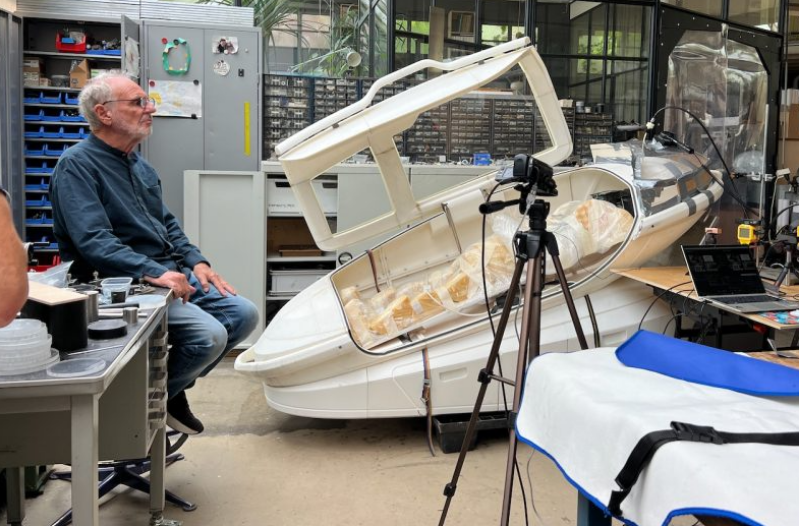
A leading evangelical body in Switzerland has lambasted the creation of the Sarco pod as the latest invention to assist people choosing to die – as the first person to use the suicide chamber is reported missing after concerns emerged about her mental health.
Person X, aged 55, as the American woman listed to euthanize herself on July 17 is known, had traveled to Switzerland, according to reports, but Zurich Cantonal Police confirmed that her current whereabouts were unknown. Reports say she had been told that she was not a suitable euthanasia candidate for the capsule, dubbed the ‘Tesla of death’ by popular media due to its visual appearance - although there is no association with Elon Musk's electric car manufacturer.
A press release for euthanasia rights group Exit International confirmed that Philip Nitschke, 76, inventor of the Sarco pod and known in popular press as ‘Dr Death’, said the arranged suicide had been “permanently postponed” because of the woman’s “deteriorating mental health.”
“Given her situation, it is clear that this is a person who should now be receiving mental health care, rather than any suicide assistance,” Nitschke reportedly said.
Nitschke had been warned by prosecutors in the Swiss Schaffhausen Canton that he faced legal repercussions if the assisted suicide went ahead, although the Swiss Criminal Code allows someone to help a person to die if the motives are altruistic.
Designed to be 3D printed anywhere
The original suicide death capsule designer Alexander Bannink, from Alexander Bannink Industrial Design, in Heemstede, Netherlands told Christian Daily International that he did not want to comment on the death capsule project, which he has not been involved in for the past three years: “In the beginning, to my understanding, this project was not what it currently has become.”
He emphasized strongly that he wanted to distance himself completely from discussing the project unless he received a signed declaration of consent from Nitschke.
Christian Daily International also reached out to the designer of the third iteration of the pod (Sarco 3.0) based in Rotterdam, The Netherlands. No response had been received at the time of publication.
Similarly, a request for comment sent to Nitschke about the project remained unanswered to date.
Nitschke has previously commented that people told him the strong association in Europe between gassing someone to death in a Sarco pod and the gas death chambers used in the Holocaust would be too strong. Yet, he found that it “doesn’t seem to be so bad after all.”
The Sarco website explains, however, that the pod is not actually a gas chamber as it involves a low oxygen environment, rather than poisonous gas. The pod allegedly kills someone within five to ten minutes as it produces a rapid decrease in oxygen levels while keeping low carbon dioxide levels at the same time, akin to the experience of an airplane depressurising.
The pod had been “inspired” by Tony Nicklinson, from the U.K. who had locked-in syndrome and his lawyers asked Nitschke to explore technology to help him die. He suffered a serious stroke in 2005 leaving him paralyzed and he died of pneumonia in August 2012, after refusing food, and in the company of his wife and daughters.
The Sarco's inventors suggest that the pod is intended to be used anywhere, with the help of 3D printing, taking a month to print and at a cost of 17,000 Euros (18,000 USD).
According to the Sarco website, “All you have to do as a patient is answer three questions to determine your presence of mind. Who are you? Where are you? And do you know what happens when you push the red button?’”
'Life is gift of God', 'man not meant to control death'
Meanwhile the Schweizerische Evangelische Allianz (SEA), the body uniting evangelicals in Switzerland, stated that they unequivocally reject any form of assisted suicide regardless of the chosen method.
“What particularly irritates us about the suicide capsule and the organisation behind it is the attitude that control over one's own death is a fundamental human right,” SEA spokeswoman Daniela Baumann said. “For us, man is the administrator and not the owner of life: life is a gift from God and man has no right of disposal over it.”
The spokeswoman also expressed concerns about the seeming commercialisation of suicide methods.
“Yes, we see a danger that suicide will be trivialised and banalised and that the decision will not be examined seriously enough. This can be seen, for example, in the fact that the promoters of the suicide capsule do not want to involve a doctor. This contrasts with the current methods of assisted suicide in Switzerland, where a doctor must always be involved.”
However, the spokeswoman was less concerned that Sarco will be adopted widely across Switzerland and further afield.
“We are sceptical that this will happen: Some cantons have already made it clear that they will not authorise the use of the suicide capsule on their territory. Other euthanasia organizations have also expressed their opposition.
“As Christians, we should not only speak out against the use of Sarco, but also explain that we are in favor of life and why: because life is a gift from God; because God gives every human being, as his image, unlosable and inviolable dignity and accepts and loves them regardless of illness, disability or other suffering.”
Baumann also opined that extremely unwell people, feeling desperate enough to kill themselves via a Sarco capsule or any other method, can be helped if the appropriate medical and pastoral care is provided, according to the type of suffering.
“In the case of an incurable illness, palliative care can alleviate the symptoms. Also, psychological and pastoral support and counseling, understanding and compassion can help a person to cope better with their suffering and, ideally, regain a sense of purpose and joy in life.”
Reflecting on the reality that assisted suicide has been an accepted practice in Switzerland for decades, Baumann asked for prayers, “for a society that recognises the value and dignity of every life and makes decisions about assisted suicide on this basis. And for people who want to die to be able to experience themselves as people loved and wanted by God, regardless of their life situation.”
This article discusses suicide. If you struggle with suicidal ideation, there is help available.
Correction Aug 28, 2024: Upon request, the name of the designer has been removed from the article for reasons of personal safety.





